How Mexican nuns saved a butcher's business and a Christmas tradition
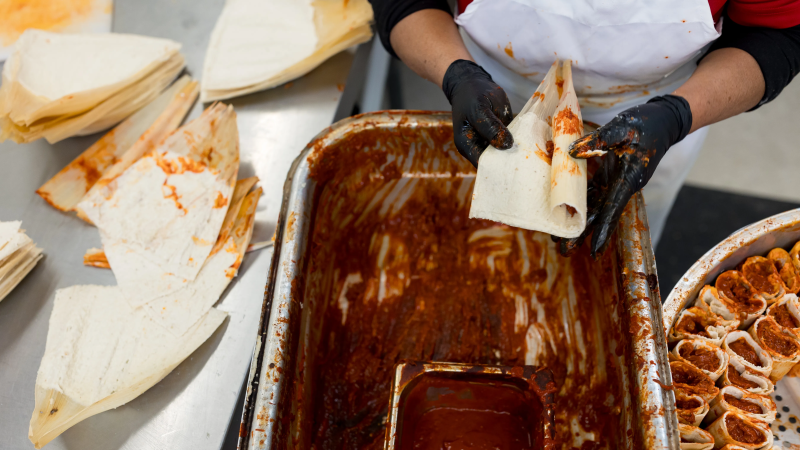
EL PASO, Texas – Melissa Santos knocked on the door of the El Paso Times newspaper holding a bag filled with two dozen tamales.
A "best tamales in town" story had published in the newspaper, which is part of the USA TODAY Network, in December – sacred days for a Borderland tradition of making and eating tamales at Christmastime. Santos smiled with the confidence of someone who knew the tamales made by her family's independent grocery, Food City, deserved a spot on the list, though they'd been left off.
"We sell out within two hours in the morning, until the next batch is ready," she said.
In the culture of the Texas Borderland, braided tightly with Mexico, the tamal tradition begins with the cold weather and accelerates during the holiday celebrations known affectionately as "Guadalupe-Reyes" – the Catholic holy days from Dec. 12, the day of the Virgin of Guadalupe, to Jan. 6, the day of Los Reyes Magos, or Three Kings Day.

At a Food City, in an aging strip mall, signs taped to cashier stalls advise shoppers of a "limit of two dozen tamales per household" through Christmas Eve – even though they know customers flout the rule and bring their family members to buy two dozen apiece, Santos said. The store stopped taking special orders years ago.
The Santos family has no idea what the real demand is, because Food City can only ever make 36,000 tamales in December and that's how many they sell.
It's not a family recipe that keeps customers coming back, Santos said. The original belongs to Catholic nuns from Mexico, of the Dominican order, who four decades ago needed money to build their convent. And in asking for assistance, they ended up helping the Texas butcher who founded Food City save his business.
"It's a long story," Maria de la Salud Garcia Fuerte, 70, said by phone from her convent in Tampico, Mexico. "You'll like it."
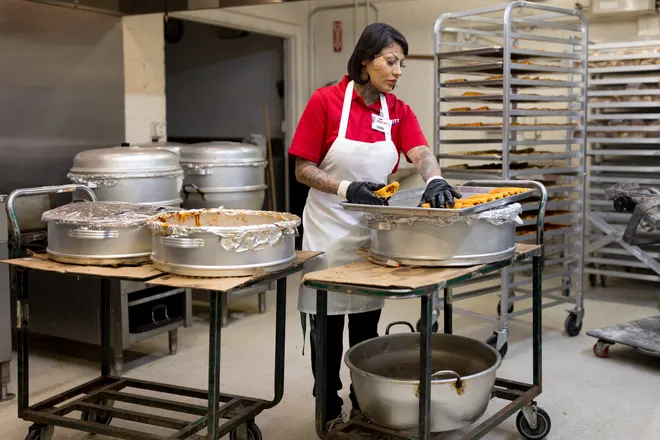
A collective craving for tamales
Many families in El Paso spend the holidays together preparing tamales for Christmas Eve.
The process takes hours, at best, even with many hands making light work.
It requires mixing the corn masa, or dough, by hand with pork lard; preparing the savory or sweet fillings; soaking the corn husks; spreading a layer of masa on an open husk, spooning in filling, then carefully folding each tamal like a gift. The lot is placed in a large pot, in concentric circles, to steam-cook.
In El Paso, the flavors are almost always the same: pork with red chile; chicken with green chile; cheese with green chile slices; and, sometimes, sweet tamales studded with raisins.
When the first hint of cold weather hits the desert, a collective craving sets in and El Pasoans head to their favorite bakery or grocery to buy tamales by the dozen.
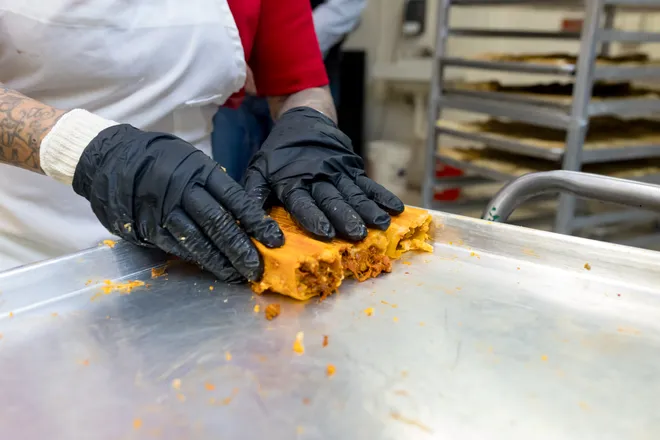
'Why don't you let us make tamales?'
In the early 1980s, a group of Catholic nuns from Mexico set out on a tour of U.S. cities in hopes of raising money to build their convent and a chapel where they could pray.
They were young and motivated. Garcia Fuerte arranged for a trip that would take the women to Los Angeles, Dallas and Chicago.
But in Los Angeles, they found no one willing to help them. They came up short in Dallas, too. On their way between the cities, they stopped in El Paso and something about the city called them back, Garcia Fuerte said.
Instead of continuing to Chicago, they returned to the border city so close to Mexico that, at night, in a seabed of twinkling lights, it's hard to tell where El Paso ends and Ciudad Juárez begins.
That's when they met José "Joe" Santos, a butcher who got his start as a meat cutter in Safeway and who, in 1972, had opened his own grocery, Food City, in downtown El Paso. His family name means "saints" in Spanish.
"A religious woman introduced us to Mr. Santos," Garcia Fuerte said. "Mr. Santos said, 'I don't know how to help you but why don't I give you a television set to put at the door of the store and you can sell raffle tickets."
The nuns tried to sell tickets all day, in vain.
"So I went and knocked on Mr. Santos' office door," Garcia Fuerte said. "I told him, 'It's so boring out front. Why don't you let us make tamales in your kitchen? And I'll sell them on the weekend.' He said, 'No, we'll sell the tamales right here in the store.'"
Garcia Fuerte said she wanted to start right away. So the businessman and the nuns went shopping inside the store for the pork, chicken, chile and other ingredients they'd need. And the nuns started cooking the meat and cleaning the corn husks.
Food City was struggling financially. Santos was close to going out of business when the nuns showed up asking for help, said Stanley Santos, one of the elder Santos' seven children, who now runs the business.
"I still remember their faces," he said. "They got in there with their habits, with aprons on. And we got a couple of people to go in and help so they could learn."
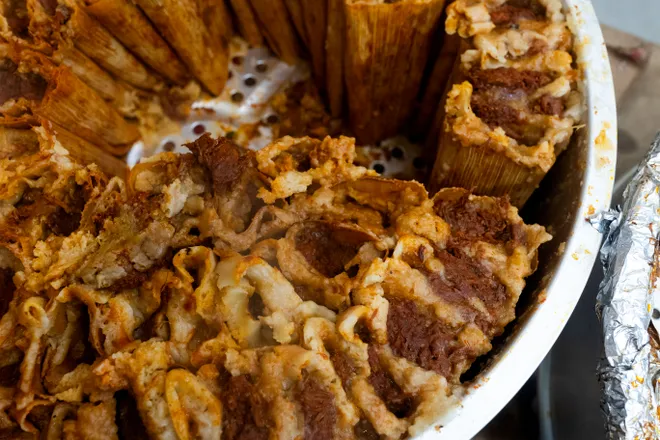
A story of salvation
The way Garcia Fuerte tells it, Joe Santos was the answer to their prayers. The nuns made as many tamales as they could; Santos froze them and sold them at Food City and paid the nuns $4 a dozen. They'd travel again to El Paso and do it all over. Within two years, she said, they had saved enough to build their chapel.
But the way the Santos family tells it, the nuns saved the family business.
"That's how it started," Stanley Santos said. "And now people come from all over El Paso to buy our tamales."
Joe Santos died in December 2017, at 89. His obituary said he served in the Navy and was revered for his community service. But "his most important legacy was his kindness and generosity to the countless nuns, priests and churches through El Paso, Mexico and other countries."
Garcia Fuerte remembers him fondly. It's been years she returned to El Paso, she said. Their small convent is shrinking; there are 12 nuns where there once were 20.
"Mr. Santos told us that, thanks to us, his business came back," Garcia Fuerte said. "But not because of the tamales; because of our prayers for him. That's part of our work: to pray for others."
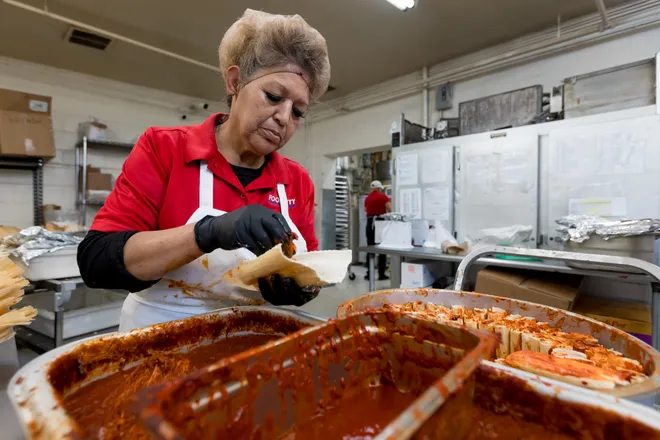
'Memories about food'
On a Tuesday evening before Christmas, customers waited in line at Food City to pick up freshly baked "pan dulce," Mexican-style sweet breads and cakes. A man behind the bakery counter wore a white apron and took orders.
Asked when the next batch of tamales would be ready, the man behind the counter leaned in and said, as if sharing a secret, "They start restocking for the morning at 8:30 p.m. In the morning, they go fast. We close at 9 p.m. So play it how you want."
How the Food City tamales stacked up against the others in town wasn't the point. The shoppers who would line up for their two dozen tamales apiece would have their reasons: a craving, convenience or perhaps a fond memory of the recipe handed down by the nuns.
"People, when they think back to memories of their families, a lot of it's centered around food," said Melissa Santos. "Memories about food, how this tasted or the smell of this. So whether they're buying the ingredients from us, or they're buying the ready made food, you know their tradition started here."
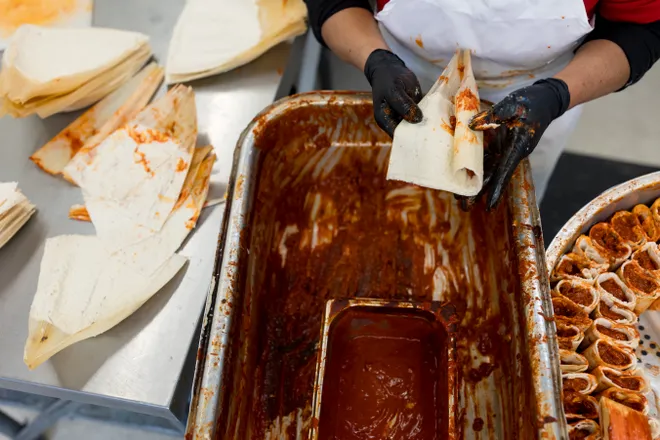
Disclaimer: The copyright of this article belongs to the original author. Reposting this article is solely for the purpose of information dissemination and does not constitute any investment advice. If there is any infringement, please contact us immediately. We will make corrections or deletions as necessary. Thank you.




